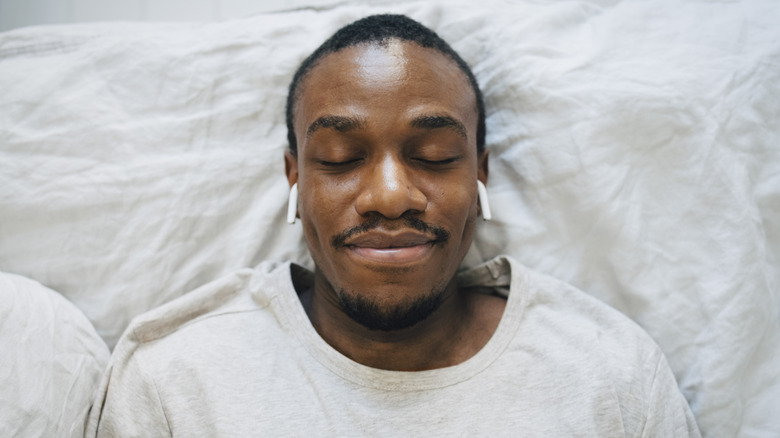When Magnesium And Melatonin Are Taken Together, This Is What Happens To Your Sleep
It's a busy world. Some weeks, it can be tough to snooze much, let alone snag the seven hours of sleep that's recommended for adults by health experts. But what happens if poor sleep quality is an everyday experience? In that case, you may wonder if natural products like melatonin and magnesium could help, especially if they're taken together.
Why pair these two products as a strategy to get your sleep cycle back on track? For one, the effectiveness of adding melatonin (the hormone in charge of your circadian rhythm) to your before-bedtime routine has been extensively studied.
A 2022 review of 23 clinical trials in the Journal of Neurology found that melatonin significantly and positively affected sleep quality in adults. These findings mirrored some of those of a 2013 review from PLOS that also concluded that melatonin could help people fall asleep faster, stay asleep longer, and feel like they had a better night's sleep.
Magnesium, a mineral that your body depends upon for a range of functions, has shown promise as a helpful sleep aid, too. As a 2023 review from Biological Trace Element Research showed, magnesium usage may promote sleep quality in adults. However, the review cautioned that magnesium might not work for all sleep-related problems and deserved future studies.
Magnesium and melatonin are a potential dream team
Melatonin and magnesium have been tested for their efficacy as a "tag team" sleep aid in experiments. For instance, a 2011 trial from the Journal of the American Geriatrics Society revealed that when older adults took a mixture of melatonin, magnesium, and zinc for eight weeks, they exhibited fewer insomnia responses than their peers who took a placebo.
However, this doesn't mean that all melatonin-magnesium experiments are undeniably favorable. A 2024 trial from Chronobiology International explored the outcomes of taking melatonin and magnesium for four weeks in adults with poor sleep. Although subjects were able to fall asleep more rapidly and sleep longer, they didn't feel like their sleep quality had improved.
Given these somewhat inconclusive outcomes, you may wonder if you should invest in two supplements. According to Dr. Abhinav Singh in a Sleep Foundation article, you might want to back up your melatonin with magnesium if your sleep issues are caused by a specific condition. Explained Singh: "Magnesium may help with sleep problems, especially if they are related to scenarios which are caused by a deficiency of magnesium, such as leg cramps."
Anchor your sleep goals with one supplement
In an interview with CNBC Make It, licensed clinical psychologist Shelby Harris doubled down on the idea of focusing initial attention on melatonin and then seeing if magnesium brings any further positive effects. "Melatonin is the most common natural sleep aid that can help gradually shift the body's circadian rhythm when taken properly," noted Harris. "Magnesium supplements might be helpful for prompting sleep, but the reality is that this hasn't been routinely proven in research."
Of course, as long as you and your healthcare provider feel that melatonin and magnesium may be beneficial, you may want to give the duo a go. Just be sure to stay within the daily magnesium limits of 310-420 milligrams (depending on your age and gender) to avoid overuse symptoms like gastrointestinal reactions and, in extreme cases, cardiac arrest. An easy — and healthy — way to stay within those limits is to eat foods to boost your magnesium instead of getting your magnesium from a supplement bottle, which can lead to ingesting more than you need.



